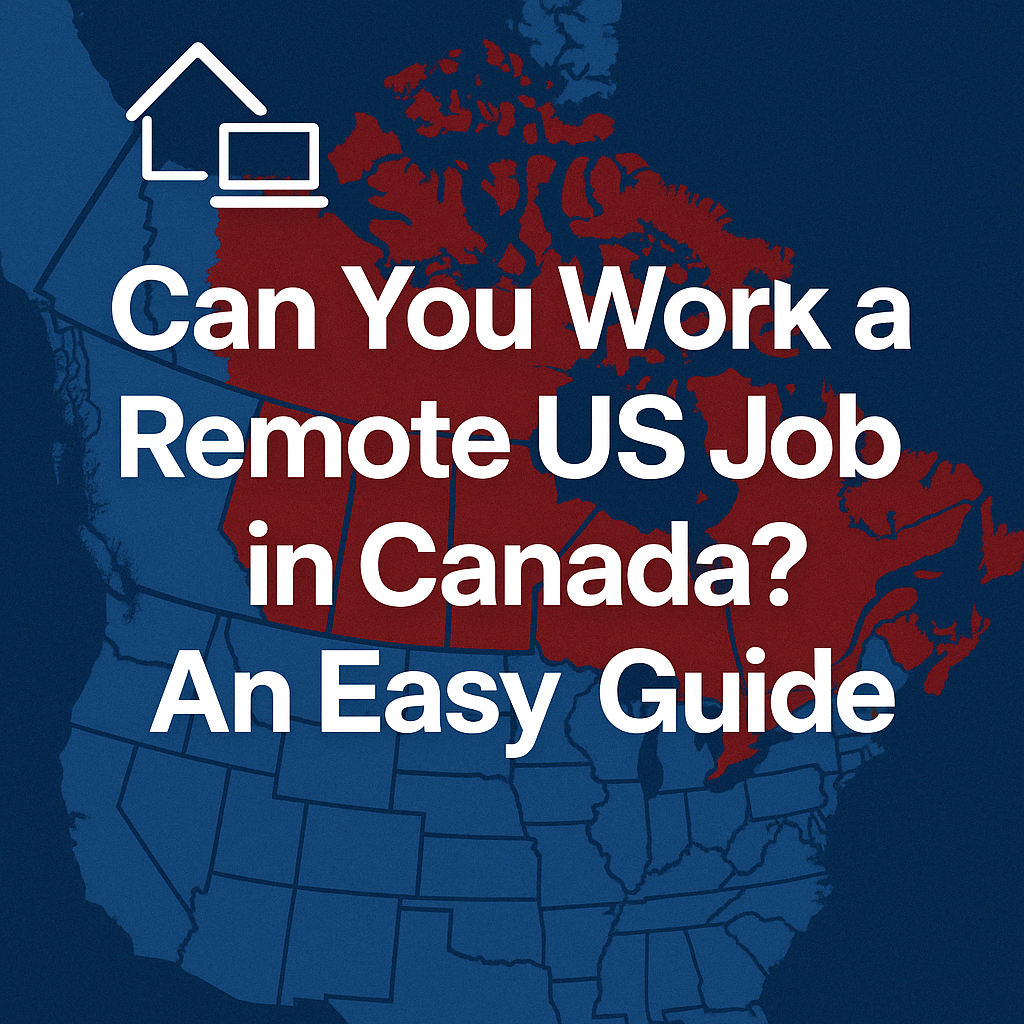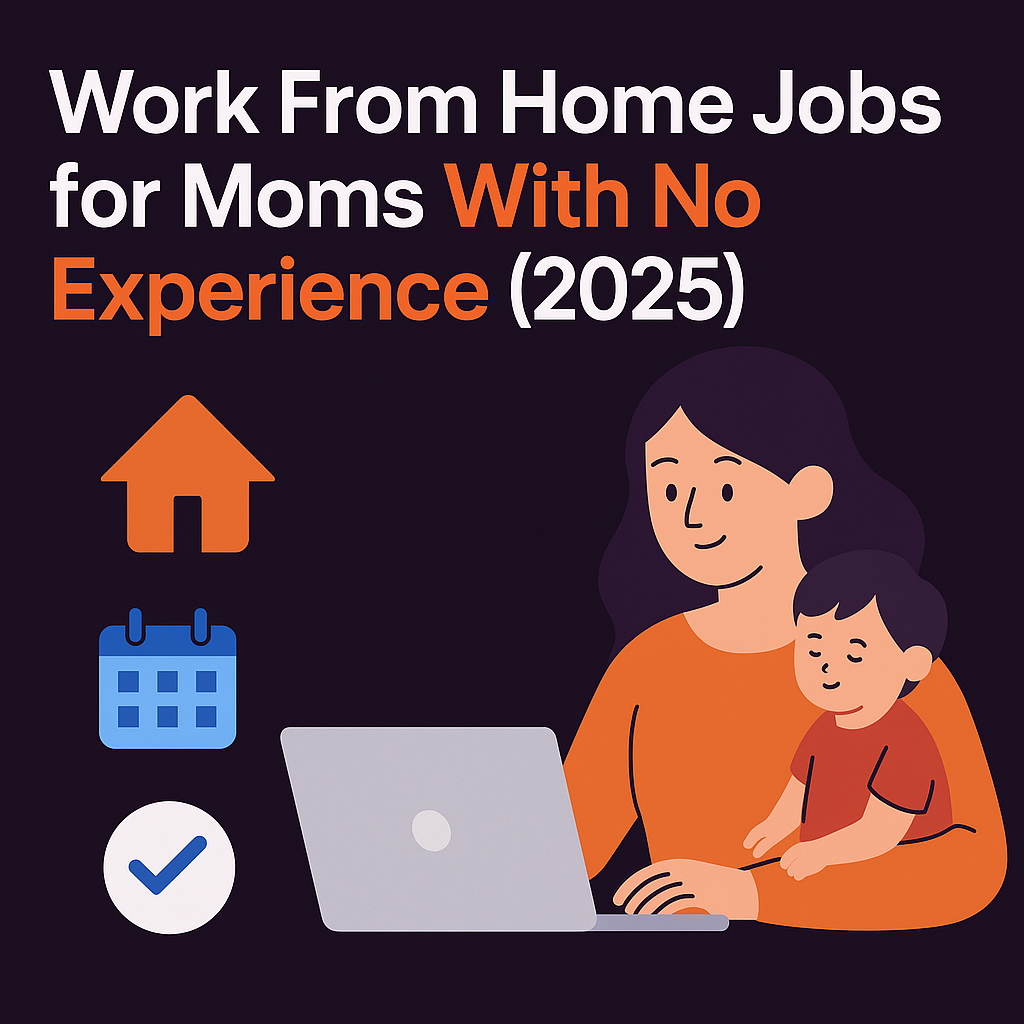Remote work is changing how we work. Canadians can now work for US companies from home, earning good money while staying in Canada. But is it easy to do? What are the rules? This guide answers: Can you work a remote US job in Canada? We’ll cover the laws, taxes, setup, benefits, challenges, and trends in simple terms.
Introduction
Remote work is growing fast, letting Canadians work for US companies without moving. You can live in Canada, enjoy its benefits like healthcare, and earn US dollars. But you need to know about taxes, laws, and how to set up your work. This guide explains it all clearly, so you can decide if it’s right for you.
Legal Rules

Working remotely for a US company from Canada is simple for Canadians. Here’s what you need to know:
- No Visa Needed: Canadian citizens and permanent residents can work from Canada without a special visa. You’re already allowed to work here! (Work Well Remote)
- Working in the US: If you visit the US and want to work remotely, you need a US work visa, like a TN or H-1B. Working without one is against the rules (Wise).
- Non-Canadians: If you’re not a Canadian citizen but live in Canada on a work permit, check if your permit lets you work for a US company. Some permits are only for specific jobs. Ask an immigration expert (The Way Immigration).
- US Citizens in Canada: If you’re a US citizen visiting Canada, you can work remotely for a US company for up to 6 months without a permit, as long as your clients are outside Canada. Staying longer needs an extension (The Way Immigration).
Key Takeaway: Canadians can work remotely for US companies from Canada without a visa, but check rules if you’re not Canadian or want to work from the US.
Taxes

Taxes can be tricky when you work for a US company from Canada. Here’s the simple version:
- Canadian Taxes: You must tell the Canada Revenue Agency (CRA) about all your income, including US earnings. You pay Canadian taxes if you live in Canada for more than 183 days a year (CRA).
- US Taxes: Your US employer might take out US taxes, so you may need to file a US tax return. You’ll get forms like W-2 (for employees) or W-8BEN (for contractors) (Work Well Remote).
- No Double Taxes: A Canada-US tax agreement stops you from paying taxes twice. If you pay US taxes, you can claim a credit on your Canadian taxes to lower what you owe (CRA).
- Employee vs. Contractor:
- Employees: Your employer handles US tax deductions and gives you a W-2 form. You report this income to the CRA.
- Contractors: You handle taxes yourself in both countries. You may need to pay taxes every few months. This is harder, so track your income carefully (Syndesus).
- Home Office Costs: You might deduct part of your rent, internet, or utilities for your home office. Rules vary by province, so ask a tax expert (The Way Immigration).
- Other Taxes: Employees in Canada pay into the Canada Pension Plan (CPP) and Employment Insurance (EI). Contractors don’t, but they manage more tax paperwork (Syndesus).
- Avoid Problems: If your employer doesn’t know you’re in Canada, you could face tax issues or penalties. Be clear about where you live (Syndesus).
Table: Your Tax Tasks
| Task | You (Canadian) | US Employer |
|---|---|---|
| File Taxes | Tell CRA about all income; file US return if needed. | Take out US taxes; give W-2 or W-8BEN forms. |
| Pay Taxes | Pay Canadian taxes; pay CPP/EI (if employee). | Deduct US taxes (if needed). |
| Avoid Double Tax | Claim tax credit for US taxes paid. | Make sure tax forms are correct. |
| Deductions | Deduct home office costs (ask tax expert). | N/A |
Key Takeaway: You’ll pay Canadian taxes and maybe file US taxes, but a tax agreement helps. A tax expert makes it easier.
Visa and Immigration Rules

Canadians don’t need a visa to work remotely for a US company from Canada. But other situations might have rules:
- No Visa for Canadians: Canadian citizens and permanent residents can work from Canada without a US visa, like H-1B or TN. Your work happens in Canada (Work Well Remote).
- Non-Canadians: If you’re in Canada on a work permit, check if it allows US remote work. Some permits are only for specific employers. Ask an expert (The Way Immigration).
- Immigration Benefits:
- Canadian Experience: Remote work for a Canadian company counts as Canadian work experience. This helps with permanent residency through Express Entry. Work for a US company doesn’t count (The Way Immigration).
- Provincial Programs: Remote work might not help with Provincial Nominee Programs if you live and work in different provinces (The Way Immigration).
- Permanent Residency: If you’re a permanent resident, remote work abroad doesn’t count toward living in Canada (2 out of 5 years) for residency or citizenship (The Way Immigration).
- Healthcare: Public healthcare depends on your province and status. Visitors or US citizens may need private insurance (The Way Immigration).
Table: Immigration and Remote Work
| Situation | Counts as Canadian Experience? | Helps PR/Citizenship? |
|---|---|---|
| Work for Canadian company | Yes | Helps Express Entry; not PR residency. |
| Work for US company | No | Doesn’t help PR or citizenship. |
| Non-Canadian on permit | Depends on permit | Check with immigration expert. |
Key Takeaway: Canadians need no visa for remote US work, but non-Canadians and immigration hopefuls should check rules.
How to Set Up Your Remote Job

Setting up a remote job with a US company is easy if you plan well. Follow these steps:
- Get Fast Internet: You need strong internet for video calls and work tasks. Test your connection to make sure it’s reliable (Work Well Remote).
- Handle Time Zones: Know the time difference between your city and your employer’s. For example, Vancouver is 3 hours behind New York. Plan meetings that work for both (Work Well Remote).
- Build a Home Office: Set up a quiet space with a good computer, webcam, and secure internet. Use a VPN to keep work safe (Work Well Remote).
- Know Your Role: Are you an employee or contractor? Employees get taxes taken out; contractors handle their own. An Employer of Record (EOR) can make taxes and laws easier (Syndesus).
- Talk to a Tax Expert: A tax pro helps with Canadian and US taxes, deductions, and avoiding mistakes (Syndesus).
- Follow Canadian Laws: Employees must follow provincial rules, like minimum wage and vacation pay. An EOR helps your employer meet these laws (Syndesus).
Table: Setup Checklist
| Step | What to Do |
|---|---|
| Internet | Get fast, reliable connection. |
| Time Zones | Plan schedules with US team. |
| Home Office | Set up secure space with computer and VPN. |
| Role | Decide employee or contractor; consider EOR. |
| Taxes | Hire tax expert for Canada and US. |
| Laws | Follow provincial work rules (e.g., minimum wage). |
Key Takeaway: A good setup needs fast internet, a secure office, and help from tax and legal experts.
Why It’s Awesome

Working for a US company from Canada has big benefits:
- For You:
- Save Time: No commute means more time for family or hobbies (Syndesus).
- Earn More: US jobs often pay better, and the exchange rate helps (Border Solutions).
- Grow Your Career: Work with international teams to boost your skills (Indeed Canada).
- Stay in Canada: Enjoy healthcare, CPP, and EI (if an employee) (Syndesus).
- No US Visa: Work legally without US visa hassles (Syndesus).
- For Employers:
- Hire Great People: Find skilled Canadians without opening a Canadian office (Syndesus).
- Save Money: Pay less due to exchange rates and no office costs (Border Solutions).
- Grow Big: Hire more Canadians to expand easily (Syndesus).
Key Takeaway: You get better pay, flexibility, and career growth, while employers save money and find talent.
Challenges to Watch For

There are some hurdles to plan for:
- Tricky Taxes: Filing taxes in two countries is hard. A tax expert helps (Syndesus).
- Time Zones: Working with US teams can mean odd hours, especially in Western Canada (Work Well Remote).
- Laws: You must follow Canadian work rules, like overtime or vacation pay. An EOR makes this easier (Syndesus).
- Immigration: Non-Canadians may face issues with residency or citizenship goals (The Way Immigration).
- Security: Use a VPN and secure internet to protect work data (Work Well Remote).
Key Takeaway: Taxes, laws, and time zones can be tough, but planning and experts help.
Remote Work Trends in Canada
Remote work is huge in Canada. Statistics Canada says:
- May 2016: 7% worked from home.
- April 2020 (Pandemic): 40% worked from home.
- January 2022: 30% worked from home.
- November 2023: 20% worked from home.
Remote work is still more common than before the pandemic. Other facts:
- Worker Choices: 41% want to work half their hours remotely; 39% want mostly remote work (Made in CA).
- Work Better: 90% of remote workers say they’re as productive or more than in an office (Made in CA).
- Cross-Border Jobs: More Canadians likely work for US companies as remote work grows (Border Solutions).
Table: Remote Work in Canada
| Time | % Working from Home | What It Means |
|---|---|---|
| May 2016 | 7% | Before pandemic. |
| April 2020 | 40% | Pandemic peak. |
| January 2022 | 30% | After peak. |
| November 2023 | 20% | Still common. |
Key Takeaway: Remote work is popular, with 20% of Canadians at home in 2023, making US jobs more doable.
Wrapping It Up
Yes, you can work a remote US job from Canada! Canadians don’t need a visa, and a tax agreement prevents double taxes. Set up a good workspace, follow Canadian laws, and talk to a tax expert. With 20% of Canadians working from home in 2023, this is a great time to try it. Plan carefully, and you’ll enjoy higher pay, flexibility, and a better career while staying in Canada.




